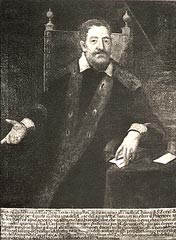| Thomas Flanginis (Tommaso Flangini) | |
|---|---|
 | |
| Born | 1578 Corfu, Republic of Venice |
| Died | 1648 |
| Main interests | Greek literature |
Thomas Flanginis (Greek: Θωμάς Φλαγγίνης, Italian: Tommaso Flangini; 1578–1648) was a wealthy Greek lawyer and merchant in Venice, who founded the Flanginian School, a Greek college where many teachers were trained. The ‘Flanginian School’ established by Thomas Flanginis remained a renowned establishment for several centuries. He owned the Palazzo Flangini in Venice.
His father Apostolos Thomas was originally from the island of Corfu while his mother Maria Flangini was from the island of Cyprus.
See also
References
- Biucchi, Edwina – Pilling, Simon – Collie, Keith (2002). Venice: an architectural guide. Batsford. ISBN 0-7134-8781-X.
Tommaso Flangini, a wealthy Greek merchant and . in 1664 . a late entrant to the Venetian Republic's patriciate) were enclosed
{{cite book}}: CS1 maint: multiple names: authors list (link) - Goy, Richard John (1997). Venice: the city and its architecture. Phaidon. p. 235. ISBN 0-7148-3005-4.
Immediately adjacent again is the imposing Collegio Flangini...built from the legacy of Tommaso Flangini, a wealthy Greek merchant whose family had been enrolled in the Venetian patriciate in 1664;
- Runciman, Steven (1986). The Great Church in Captivity: A Study of the Patriarchate of Constantinople from the Eve of the Turkish Conquest to the Greek War of Independence. Cambridge University Press. p. 212. ISBN 0-521-31310-4.
In 1626 a rich Venetian Greek, Thomas Flanginis, presented the colony with a large sum of money to be spent on education;
- Runciman, Steven (1986). The Great Church in Captivity: A Study of the Patriarchate of Constantinople from the Eve of the Turkish Conquest to the Greek War of Independence. Cambridge University Press. p. 212. ISBN 0-521-31310-4.
- ^ Diamandouros, Nikiforos P. (1976). Hellenism and the first Greek war of liberation (1821-1830): continuity and change. Institute for Balkan Studies. p. 67. OCLC 3734742.
In 1626 a Cypriot, Thomas Flanginis, took the step of establishing in Venice what remained for about two centuries the most famous higher school established by a Greek for Greeks in Western Europe. This so-called Flangeneion school ...
- Politēs, Linos (1973). A history of modern Greek literature. Clarendon Press. p. 50. ISBN 9780198157212. Retrieved 28 November 2010.
- Deutsche Akademie der Wissenschaften zu Berlin, Institut für Griechisch-Römische Altertumskunde, Deutsche Akademie der Wissenschaften zu Berlin (1968). Berliner byzantinistische Arbeiten. Akademie-Verlag. p. 229. ISSN 0067-6055.
Thomas Flangini. He was born at Venice In 1579 of Apostólos Thomas of Corfu, and María daughter of Vincent Flangini, of Cyprus. His father held an eminent position in the Greek Community of Venice, but left him orphan vегу soon.
{{cite book}}: CS1 maint: multiple names: authors list (link) - Goy, Richard John (1997). Venice: the city and its architecture. Phaidon. p. 234. ISBN 9780714830056.
Greek families from Venice's overseas empire were admitted to the nobility, among them the Flangini from Cyprus.